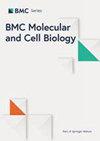Long non-coding RNA SOX2OT in tamoxifen-resistant breast cancer
IF 2.7
3区 生物学
Q4 CELL BIOLOGY
引用次数: 0
Abstract
Hormone receptor (HR)-positive breast cancer can become aggressive after developing hormone-treatment resistance. This study elucidated the role of long non-coding RNA (lncRNA) SOX2OT in tamoxifen-resistant (TAMR) breast cancer and its potential interplay with the tumor microenvironment (TME). TAMR breast cancer cell lines TAMR-V and TAMR-H were compared with the luminal type A cell line (MCF-7). LncRNA expression was assessed via next-generation sequencing, RNA extraction, lncRNA profiling, and quantitative RT-qPCR. SOX2OT overexpression effects on cell proliferation, migration, and invasion were evaluated using various assays. SOX2OT was consistently downregulated in TAMR cell lines and TAMR breast cancer tissue. Overexpression of SOX2OT in TAMR cells increased cell proliferation and cell invasion. However, SOX2OT overexpression did not significantly alter SOX2 levels, suggesting an independent interaction within TAMR cells. Kaplan–Meier plot analysis revealed an inverse relationship between SOX2OT expression and prognosis in luminal A and B breast cancers. Our findings highlight the potential role of SOX2OT in TAMR breast cancer progression. The downregulation of SOX2OT in TAMR breast cancer indicates its involvement in resistance mechanisms. Further studies should explore the intricate interactions between SOX2OT, SOX2, and TME in breast cancer subtypes.他莫昔芬耐药乳腺癌中的长非编码 RNA SOX2OT
激素受体(HR)阳性乳腺癌在出现激素治疗耐药后会变得具有侵袭性。本研究阐明了长非编码RNA(lncRNA)SOX2OT在他莫昔芬耐药(TAMR)乳腺癌中的作用及其与肿瘤微环境(TME)的潜在相互作用。将 TAMR 乳腺癌细胞系 TAMR-V 和 TAMR-H 与腔内 A 型细胞系(MCF-7)进行了比较。通过新一代测序、RNA提取、lncRNA图谱分析和定量RT-qPCR评估了LncRNA的表达。使用各种检测方法评估了 SOX2OT 过表达对细胞增殖、迁移和侵袭的影响。在TAMR细胞系和TAMR乳腺癌组织中,SOX2OT持续下调。在 TAMR 细胞中过表达 SOX2OT 会增加细胞增殖和细胞侵袭。然而,SOX2OT 的过表达并没有显著改变 SOX2 的水平,这表明在 TAMR 细胞中存在独立的相互作用。Kaplan-Meier图分析显示,SOX2OT的表达与管腔A型和B型乳腺癌的预后呈反比关系。我们的研究结果突显了 SOX2OT 在 TAMR 乳腺癌进展中的潜在作用。SOX2OT在TAMR乳腺癌中的下调表明其参与了耐药机制。进一步的研究应探讨乳腺癌亚型中SOX2OT、SOX2和TME之间错综复杂的相互作用。
本文章由计算机程序翻译,如有差异,请以英文原文为准。
求助全文
约1分钟内获得全文
求助全文
来源期刊

BMC Molecular and Cell Biology
Biochemistry, Genetics and Molecular Biology-Cell Biology
CiteScore
5.50
自引率
0.00%
发文量
46
审稿时长
27 weeks
 求助内容:
求助内容: 应助结果提醒方式:
应助结果提醒方式:


